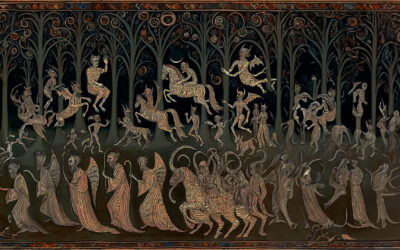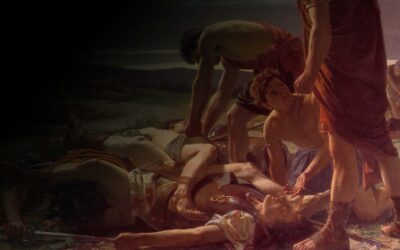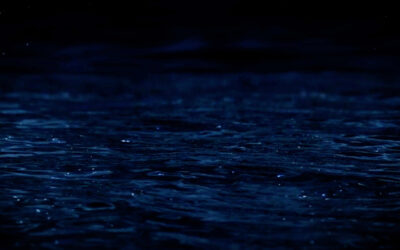In 79 A.D. Mount Vesuvius erupted and laid waste to many towns around the Bay of Naples. Towns like Pompeii, Stabiae, Oplontis, Boscoreale and Herculaneum.
Introduction
Today we are going to take a walk along the 2000-year-old streets of Herculaneum, visit Roman houses, look at beautiful frescoes, and learn about the town, its inhabitants, and the eruption.
According to tradition the eruption of Vesuvius occurred in 79 A.D. on the 24th of August, a date that has been disputed of late; prior to this the volcano had been dormant for about 800 years.
Herculaneum had been inhabited since the 6th century B.C. and was at the time of the eruption a wealthy town by the seafront with about 20 hectares and 4000 inhabitants. But, as Mount Vesuvius exploded the town was buried under 14–20 meters of clay, ash and soot. It was then lost for centuries.
In the early 18th century the Roman town was rediscovered and excavations begun in 1738. Things came, more or less, to a halt when Pompeii was discovered. The Herculaneum excavations became sporadic for a long time, simply because it was easier to concentrate the efforts to Pompeii. The pyroclastic flow had been different in Pompeii and it was not buried as deep down as Herculaneum.
During the 20th century, excavations of Herculaneum started for real again and instead of digging in underground passages and wells, as had previously been the excavation technique, archaeologists now brought the sun back to shine upon Herculaneum for the first time since the eruption.
The excavated area is much smaller than that of Pompeii, with 5 hectares compared to Pompeii’s 40. Although, as mentioned, it is believed that Herculaneum as a whole was about 20 hectares, leaving a lot to be excavated in the future (so exciting!). However, Herculaneum is in many cases much better preserved than it’s sister town. Many houses are intact to the point where you can enter them and find the mosaic floors look almost new, the frescoes on the walls shine in brilliant colours and the ceiling still keeping you dry from the rain. The pyroclastic flow in Herculaneum was excruciatingly hot, and it carbonised the town, preserving even wood and other organic-based materials.
It is a marvellous place to visit. So, follow along and walk the streets of Herculaneum with us by watching the video. (And, if you can, go to Herculaneum!)
Video in Latin from Herculaneum
Audio only
I highly suggest you watch the video to discover the breath-taking streets and houses of Herculaneum, but if you are on the go, you can listen to the audio only here on Latinitium.com or in your favourite podcast app:
Transcription
This is a transcription of the video above. If you watch the video, you can activate it as subtitles.
Pro aqua oppidum
Abhinc trecentos annos, puteus non longe hinc fodiebatur sed pro aqua, alia inventa sunt. Pro aqua, hoc inventum est. Hoc oppidum quod post me videtis ferunt Herculem olim condidisse. Et haec est causa cur vocetur Herculaneum. Eamus nunc visum quale sit hoc pulcherrimum oppidum.
Anno undeoctogesimo post Christum natum, mons Vesuvius ignium eruptione cum alia tum hoc oppidum, Herculaneum, sepelivit. Sed hodie, post tot annos, licet rursus in viis et in aedibus huius oppidi versari, quod est pulcherrimum. Eamus.
In thermopolio
In thermopolio nunc sumus. Huc Herculanei homines veniebant ut cibum sumerent Huc Herculanei homines veniebant ut cibum sumerent, ut pranderent, ut fortasse cenarent—si forte esuriebant. Et post me videtis aliud conclave, et in illo conclavi postico, homines poterant considere et cibum sumere. Hoc non est solum thermopolium quod inveniatur hic Herculanei. Sunt etiam alia.
Minerva, Iuno, Hercules
In itinere, volo aliquid vobis pulcherrimi ostendere. Ingrediamur hoc aedificium ubi sodales Augustales versabantur. Nunc ipsum est satis vacuum. Proh dolor! fere nihil restat, sed unum restat idque maximum. Venite huc. Ecce!
Hic videtis pulcherrimas picturas in opere tectorio. Sunt aliquatenus tritae et lacerae, sed tamen, post fere duo milia annorum, licet tamen dicere, has picturas esse bene conservatas. A sinsistra, in illa pictura, videtis tres homines. Videtis Minervam, Iunonem, Herculem. Certe, Hercules est maximus hoc in oppido, quod oppidum olim condidit—vel sic fama fert. Sed est etiam alia pictura in opere tectorio facta, ubi idem Hercules ostenditur, effinigitur: illic. Et haec omnia dicuntur esse facta eo stilo qui vocatur quartus; stilus quartus. Sunt enim varii stili pingendi quibus usi sunt Pompeiis et Herculanei maxime.
Lautitiae pictae
In aedibus lautissimis nunc ipsum sumus. Et volo vobis ostendere picturas in opere tectorio factas, quae sunt sparsae quasi per varia conclavia huius loci. Quae hic ostenduntur non tam bene conservatae sunt sed a sinistra, si sustuleritis oculos, illic videtis ubi columna sustentat aliquid; eo ipso loco colores sunt nitidissimi et vividissimi. Est pulcherrimum, nonne? Sed pergamus.
In hac villa, praeter has pulcherrimas picturas, aliae res inventae sunt: tabulae ceratae inventae sunt. Cum loquimur de scriptis, de rebus scriptis, est alia villa, aliae aedes multo magis notae, ut puto, quae est, certe, Villa di Papyri. Et, ibi, plurima volumina scriptorum antiquorum inventa sunt. Sed, cum quasi in carbonem haec volumina abierint, difficillimum est ea legere. Et per saecula homines conati sunt haec evolvere et tum destructa omnino perdita sunt. Nostra autem memoria, novis artibus usi, homines doctissimi potuerunt nonnulla legere. Et scimus in illa villa, Villa di Papyri, servari cum alia tum opera quaedam philosophica scriptoris, cui nomen est Philodemus.
Sed nuper nova quaedam inventa sunt Senecae Historiae. Et, cum hoc cognovissem, maximo gaudio atque studio affectus sum. Et nunc cupio haec scripta quam primum legere. Sed, quantum scio, nondum in lucem edita sunt. Proh dolor! videntur esse tantummodo partes illius operis, sed nihilominus erit pulcherrimum eas partes legere.
Lavatum itur
Nunc sumus in apodyterio balnearum et hic est locus ubi homines vestimenta sua exuebant antequam lavarent. Eamus lavatum. His in balneis, fuit caldarium, frigidarium, et tepidarium. Et hic, humi, in pavimento, possumus videre pulcherrimum opus tessellatum. Proh dolor, nobis nunc videtur inversum sed non licet transilire hunc funem.
Balneis virorum visis, nunc volo vobis ostendere brevissime balneas feminarum. Etiam hic est opus tessellatum pulcherrimum et multo melius servatum.
Thermopolium aliud
Meministisne me paulo ante dixisse esse thermopolia satis multa? Et ecce hic est alius locus ubi liceat cibum sumere vel saltem ubi licuit.
Opportunitas Loci
Ut in omnibus oppidis, sic Herculanei quoque: aliae villae sunt magnae aliae parvae, aliae lautae, aliae lautissimae. Et nunc sumus in una ex his villis Et nunc sumus in una ex his villis, mea quidem sententia, lautissimis. Nam haec villa, quam post me videtis, est pulchra. Bene, non est maxima fortasse, sed opportunitas loci… Ecce! Haec enim villa sita est ad mare; immo, fere in ipsa ora maritima. Qualis olim fuit? Haec villa spectabat mare. Prospectus hinc erat in mare. Nunc, certe, non iam adest mare, vel mare obductum est. Sed antiquis temporibus ante eruptionem ignium illius montis Vesuvii illic erat mare. Et hinc erat prospectus in illud pulcherrimum mare.
Incolae
Multis aedificiis, viis, aliis rebus pulcherrimis et prorsus mirificis visis, unum, certe, vidimus deesse… Ubi sunt incolae? Certe mortui sunt. Homines docti per longum tempus putabant homines plerosque effugisse; non esse mortuos illa calamitate maxima, illa eruptione ignium, sed effugisse. Tum abhinc annos circiter triginta, aliquid inventum est: ipsi incolae. Amplius trecenta cadavera hic inventa sunt. Videntur huc fugisse cum coniugibus suis, cum liberis suis, cum amicis suis ut se… ut sibi quodammodo salutem peterent. …sed frustra. Nam vaporibus qui nati sunt ex illa eruptione ignium interfecti sunt.
Illa calamitas facta est propter illam eruptionem ignium. Sed ut intellegamus quanta fuerit vis, spectemus montem qui post me est. Hic est mons qui coaluit ex illa materia quae per vias, per aedes, per oppidum fluxit. Hic olim fuit ora maritima sed, nunc est mons. Herculaneum, quod vidimus, est locus mirificus atque magnificus.
Est aliquid mirum posse per vias tam antiquas ambulare et Latine loqui et scire eas vias, parietes aedificiorum, hanc linguam, hunc sermonem olim audiisse. Est pulcherrimum. Sed quod maius est: hoc in oppido licet sentire, vere sentire qualis vita Romanorum fuerit, quae plerumque vita nobis tam longinqua atque aliena esse videtur; quam semper per scripta cognoscimus, sed hic vere possumus cognoscere hanc ipsam vitam.
Sed certe oportet etiam meminerimus finem esse impositum huic oppido et his omnibus incolis pessimum. Neque possumus illa cadavera innumera spectare quin quodammodo afficiamur dolore. Tum ipsum sentimus vere illos Romanos fuisse homines, neque tantummodo scripta nobis reliquisse et linguam discendam sed fuisse homines qui vitam suam agerent, qui amarent, qui morerentur. Et nusquam, ita me di ament, melius haec gravissima atque pulcherrima quam hic Herculanei possumus cognoscere atque videre. Quam ob rem, maxime vobis suadeo ut Herculaneum aliquando invisatis. Tantum’st.
Bene valete.
Andreas Morehouse verba transcripsit.
















